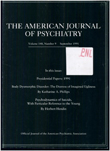Natural history of male psychological health, XII: a 45-year study of predictors of successful aging at age 65
Abstract
In order to determine important predictors of psychosocial and physical vitality in late midlife, the authors examined the lives of 173 men prospectively studied from ages 18 to 65. Biopsychosocial predictors-- gathered before age 50--were examined for their correlation with three outcome variables measured at age 65: physical health, mental health, and life satisfaction. Extent of tranquilizer use before age 50 was the most powerful negative predictor of both mental and physical health outcomes at age 65. Another important predictor for mental health was maturity of defenses before age 50. Paradoxically, warm childhood environment made an important independent contribution to predicting physical--not mental--health.
Access content
To read the fulltext, please use one of the options below to sign in or purchase access.- Personal login
- Institutional Login
- Sign in via OpenAthens
- Register for access
-
Please login/register if you wish to pair your device and check access availability.
Not a subscriber?
PsychiatryOnline subscription options offer access to the DSM-5 library, books, journals, CME, and patient resources. This all-in-one virtual library provides psychiatrists and mental health professionals with key resources for diagnosis, treatment, research, and professional development.
Need more help? PsychiatryOnline Customer Service may be reached by emailing [email protected] or by calling 800-368-5777 (in the U.S.) or 703-907-7322 (outside the U.S.).



